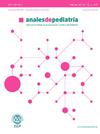SEIP/AEPap/SEPEAP/SEGHNP/SEUP关于感染性急性胃肠炎诊断和病因治疗的共识文件
IF 2.1
4区 医学
Q2 PEDIATRICS
引用次数: 0
摘要
急性胃肠炎(AGE)是全世界儿童发病率和死亡率的主要原因。AGE的微生物检测是为长期或复杂的病例和具有某些危险因素的患者预留的。应根据可获得性以及临床和流行病学背景选择诊断检测。根据疑似诊断,可要求进行以下检查:粪便或血液培养、快速检查、分子检查、卵和寄生虫检查或血清学检查。全血细胞计数和急性相反应物(APR)试验适用于有严重疾病体征的患者。社会人口和气候变化导致本地区以前罕见的病原体(新发病原体)发病率增加,这一点也必须加以考虑。还可能检测到意义不确定的微生物,这些微生物要么不应处理,要么仅在特定情况下处理。一般来说,经验性抗生素治疗不应用于AGE的管理,除非在特定情况下:年龄小于3至6个月的婴儿疑似细菌性AGE,有基础疾病的患者,败血症症状,住院患者或有传播风险的环境。在由非伤寒沙门氏菌和产志贺毒素大肠杆菌(STEC)引起的AGE病例中,靶向抗生素治疗仅限于有全身性感染风险或长期腹泻的患者。在西班牙,AGE的并发症是罕见的,脱水和肠炎后综合征是最常见的。本文章由计算机程序翻译,如有差异,请以英文原文为准。
Documento consenso SEIP/AEPap/SEPEAP/SEGHNP/SEUP sobre el diagnóstico y tratamiento etiológico de las gastroenteritis agudas de origen infeccioso
Acute gastroenteritis (AGE) is a leading cause of morbidity and mortality in pediatric patients worldwide. Microbiological testing of AGE is reserved for prolonged or complicated cases and for patients with certain risk factors. Diagnostic tests should be selected based on availability and the clinical and epidemiological context. The following tests could be requested, depending on the suspected diagnosis: stool or blood culture, rapid tests, molecular tests, ova and parasite test or serology. Complete blood counts and acute phase reactant (APR) tests are indicated in patients with signs of severe disease. Sociodemographic and climate changes have led to an increase in the incidence of pathogens previously rare in our region (emerging pathogens), which must also be considered. Microorganisms of uncertain significance may also be detected, which should either not be treated or treated only under specific circumstances. In general, empirical antibiotherapy should not be initiated for management of AGE except in specific situations: infants aged less than 3 to 6 months with suspected bacterial AGE, patients with underlying disease, signs of sepsis, institutionalized patients or settings with risk of dissemination. In cases of AGE caused by non-Typhi Salmonella and Shiga toxin-producing Escherichia coli (STEC), targeted antibiotherapy is restricted to patients at risk of systemic infection or with prolonged diarrhea. In Spain, complications of AGE are rare, and dehydration and post-enteritis syndrome are most common.
求助全文
通过发布文献求助,成功后即可免费获取论文全文。
去求助
来源期刊

Anales de pediatria
医学-小儿科
CiteScore
2.10
自引率
4.80%
发文量
155
审稿时长
44 days
期刊介绍:
La Asociación Española de Pediatría tiene como uno de sus objetivos principales la difusión de información científica rigurosa y actualizada sobre las distintas áreas de la pediatría. Anales de Pediatría es el Órgano de Expresión Científica de la Asociación y constituye el vehículo a través del cual se comunican los asociados. Publica trabajos originales sobre investigación clínica en pediatría procedentes de España y países latinoamericanos, así como artículos de revisión elaborados por los mejores profesionales de cada especialidad, las comunicaciones del congreso anual y los libros de actas de la Asociación, y guías de actuación elaboradas por las diferentes Sociedades/Secciones Especializadas integradas en la Asociación Española de Pediatría.
 求助内容:
求助内容: 应助结果提醒方式:
应助结果提醒方式:


